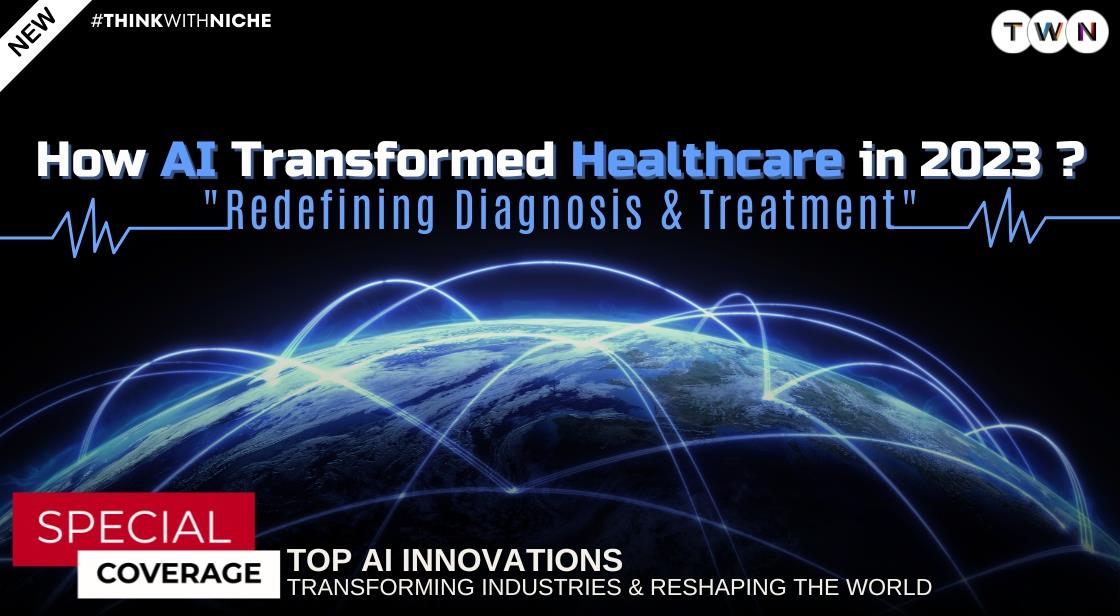How AI Transformed Healthcare in 2023: Redefining Diagnosis and Treatment

Blog Post
In the dynamic realm of healthcare, Artificial Intelligence (AI) stands as an unparalleled force, reshaping the landscape of medical practice, diagnosis, and patient care.
As we journey through 2023, the influence of AI on healthcare has been profound, revolutionizing critical facets of the industry and propelling us toward a future marked by precision, early intervention, and groundbreaking discoveries.
This in-depth exploration delves into the pivotal role that AI plays in revolutionizing healthcare. We embark on an enlightening journey, examining AI's far-reaching applications in medical imaging analysis, personalized medicine, and drug discovery.
The blog traverses across significant examples and innovations in the field, highlighting pioneering technologies such as IDx-DR, Viz.ai, Butterfly IQ, Paige AI, and more, showcasing how these advancements are altering the healthcare landscape.
Join us as we unravel the intricate threads of AI's impact on healthcare, dissecting its multifaceted contributions, and envisioning a future where technology harmoniously intertwines with human care, setting new standards for efficiency, accuracy, and patient-centric healthcare practices.
2023 witnessed significant advancements in artificial intelligence, impacting various aspects of our lives. From healthcare and climate change to art and entertainment, AI pushed boundaries and transformed the landscape.
Artificial Intelligence (AI) has emerged as a powerful force in revolutionizing the healthcare landscape. Its transformative impact is reshaping medical diagnosis, treatment, and overall patient care, leading to a future of personalized medicine, early disease detection, and more efficient drug discovery.
How AI Transformed Healthcare in 2023
1. Medical Imaging Analysis: Redefining Diagnosis Through AI
AI-powered medical imaging analysis is revolutionizing healthcare by enabling early disease detection, reducing diagnostic errors, and improving workflow efficiency. By analyzing vast datasets of medical images, AI algorithms are trained to identify subtle abnormalities with high accuracy, leading to significant improvements in patient care.
Early Disease Detection
One of the most impactful applications of AI in medical imaging is in early disease detection. AI algorithms can now identify cancerous lesions, tumors, and other abnormalities in mammograms, X-rays, CT scans, and MRIs with exceptional accuracy, often surpassing the capabilities of human radiologists. This early detection allows for earlier intervention and treatment, significantly improving patient outcomes and survival rates.
For example, IDx-DR, an AI-powered tool, can automatically detect diabetic retinopathy, a leading cause of blindness, from retinal scans. This allows for early diagnosis and treatment, preventing vision loss and improving patient quality of life.
Reduced Diagnostic Errors
AI also plays a crucial role in reducing diagnostic errors in medical imaging. By analyzing images and highlighting suspicious areas, AI assists radiologists in their diagnoses, minimizing human error and ensuring greater accuracy. This is particularly beneficial in complex cases where subtle abnormalities may be difficult to identify.
Viz.ai, an AI platform, uses deep learning algorithms to analyze brain scans and identify stroke patients within minutes. This allows for faster treatment, reducing the risk of brain damage and improving long-term recovery outcomes.
Improved Workflow Efficiency
AI-powered tools are automating many of the repetitive tasks associated with medical imaging analysis, significantly improving workflow efficiency for radiologists. This automation frees up valuable time for radiologists to focus on complex cases and spend more time with patients, providing more personalized care.
For instance, AI-based image segmentation algorithms can automatically label different anatomical structures on scans, eliminating the need for manual segmentation by radiologists. This saves time and resources, allowing radiologists to focus on more critical tasks.
Overall, AI-powered medical imaging analysis is transforming the way healthcare professionals diagnose and treat diseases. By offering early detection, reducing diagnostic errors, and improving workflow efficiency, AI is paving the way for a future of personalized medicine, improved patient outcomes, and a more efficient healthcare system.
Examples of AI applications in medical imaging analysis:
-
AI-powered tools for chest X-ray analysis can detect pneumonia, tuberculosis, and other lung diseases with high accuracy.
-
AI algorithms can analyze brain scans to identify early signs of Alzheimer's disease and other neurodegenerative conditions.
-
AI-based software can be used to analyze ultrasound scans and diagnose fetal abnormalities.
As AI technology continues to evolve, we can expect even more innovative applications to emerge in the field of medical imaging analysis, further advancing the quality of healthcare and improving patient care for everyone.
2. Personalized Medicine: Tailored Treatment Plans and Precision Medicine
The rise of AI is ushering in a new era of personalized medicine, where treatment plans are uniquely designed for each individual based on their specific genetic makeup and health data. This groundbreaking approach promises to revolutionize healthcare by:
Genetically-Guided Treatment Plans:
AI analyzes a patient's genetic data, including their DNA and RNA sequences, to predict how they may respond to different medications and treatments. This allows doctors to tailor treatment plans for each patient's unique genetic profile, maximizing the effectiveness of treatment and minimizing the risk of adverse reactions.
For example, AI can predict a patient's risk of developing side effects from certain medications, allowing doctors to choose alternative therapies with reduced risks. This personalized approach helps to ensure that patients receive the most effective and safe treatment for their specific needs.
Precision Medicine for Cancer:
In the fight against cancer, AI plays a pivotal role in developing personalized treatment plans. By analyzing tumor mutations and genetic profiles, AI can identify the most effective therapies for each individual patient. This precision medicine approach leads to:
-
Improved Remission Rates: AI-guided personalized treatment plans have been shown to significantly improve remission rates in cancer patients compared to traditional treatment approaches.
-
Enhanced Survival Outcomes: By targeting the specific mutations and genetic drivers of a patient's cancer, AI-powered therapies can lead to longer survival times and improved long-term outcomes.
-
Reduced Treatment Toxicity: Personalized cancer treatments can be less toxic and have fewer side effects than traditional treatments, improving patients' quality of life during treatment.
Predicting Disease Risk:
AI models can analyze a vast amount of health data, including genetic information, medical history, and lifestyle factors, to predict an individual's risk of developing certain diseases. This early risk assessment allows for:
-
Proactive Interventions: By identifying individuals at high risk for specific diseases, doctors can implement preventive measures and early interventions to prevent the onset of disease altogether.
-
Personalized Monitoring: For individuals identified with a high risk of developing certain conditions, doctors can recommend personalized monitoring programs for early detection and timely intervention.
-
Lifestyle Modifications: AI-based risk prediction can motivate individuals to adopt healthy lifestyle changes to reduce their risk of developing diseases, promoting preventive healthcare.
Examples:
-
Butterfly IQ: This portable ultrasound device uses AI to guide needle placement during procedures, improving accuracy and safety, particularly for patients with complex anatomies or challenging cases.
-
Paige AI: This company uses AI to analyze breast cancer biopsies, assisting pathologists in making more accurate diagnoses and providing valuable insights for personalized treatment plans.
Looking ahead, AI is poised to further revolutionize personalized medicine. By continuously developing and refining AI algorithms, we can expect even greater advancements in personalized treatment plans, leading to improved patient outcomes, reduced costs, and a future of healthcare that is tailored to each individual's unique needs.
Examples of AI applications in personalized medicine:
-
AI-based tools can analyze patient data to predict their response to specific chemotherapy treatments.
-
AI algorithms can identify genetic mutations that make patients more susceptible to certain diseases.
-
AI-powered platforms can be used to develop personalized vaccines and therapies for infectious diseases.
By embracing AI responsibly and ethically, we can leverage its potential to create a future of healthcare where each individual receives the most effective and personalized treatment possible.
3. Drug Discovery and Development: Accelerating the Process
The traditional drug discovery and development process is notoriously slow and expensive. However, AI is revolutionizing this field by significantly accelerating the process and reducing costs. Here's how:
Identifying Promising Drug Candidates:
Instead of relying on laborious and inefficient methods like high-throughput screening, AI algorithms can analyze vast amounts of biological and clinical data. This includes information on protein structures, gene expression, and drug-target interactions. By analyzing these datasets, AI can identify potential drug candidates with high therapeutic potential much faster and more accurately than traditional methods.
Repurposing Existing Drugs:
AI can analyze existing drugs and predict their effectiveness against new diseases. This process, known as drug repurposing, offers a faster and cheaper way to develop new treatment options compared to starting from scratch with novel drug candidates.
AI can identify potential repurposing opportunities by analyzing the molecular properties of existing drugs and comparing them to the biological targets of new diseases.
Virtual Drug Screening:
AI-powered platforms can perform virtual screening of millions of potential drug candidates. These platforms utilize advanced simulation techniques to predict how potential drugs bind to target molecules and assess their potential efficacy and safety.
This significantly reduces the need for expensive and time-consuming laboratory testing, streamlining the drug discovery process.
Examples:
-
Insilico Medicine: This company utilizes AI to design and develop novel drugs for various diseases, including cancer, neurodegenerative diseases, and fibrosis. They have successfully identified several promising drug candidates using their AI platform.
-
BenevolentAI: This company focuses on identifying and developing new treatments for rare diseases. Their AI platform analyzes large datasets of medical information to identify potential drug targets and repurposing opportunities for existing drugs. They have successfully identified several promising candidates for the treatment of rare diseases.
Additional Benefits:
-
Reduced development costs: By accelerating the drug discovery process and reducing the need for expensive laboratory testing, AI can significantly reduce the overall cost of bringing new drugs to market.
-
Improved success rates: AI-powered approaches can identify more promising drug candidates than traditional methods, leading to higher success rates in clinical trials.
-
Personalized medicine: AI can be used to develop personalized drugs that are tailored to the individual needs of each patient.
Examples of AI applications in drug discovery and development:
-
AI can be used to design and develop new drug delivery systems that improve the efficacy and safety of existing drugs.
-
AI can be used to personalize drug dosages and treatment plans based on each patient's individual genetic makeup.
-
AI can be used to analyze clinical trial data to identify safety risks and potential side effects of new drugs.
By embracing AI responsibly and ethically, we can harness its potential to accelerate the development of life-saving drugs and improve healthcare outcomes for all.
Looking Ahead: A Glimpse into the Future of AI in Healthcare
Artificial intelligence (AI) stands at the cusp of revolutionizing healthcare, promising a future where advanced technology empowers healthcare professionals and patients alike. As AI continues to evolve, we can expect to see significant advancements in several key areas:
Enhanced Diagnostic Accuracy and Early Disease Detection:
-
AI-powered algorithms will analyze vast medical datasets, enabling early and accurate diagnosis of complex diseases like cancer and neurological disorders. This early detection will allow for timely intervention and improve treatment outcomes significantly.
-
AI-assisted imaging analysis will offer unparalleled accuracy, allowing radiologists to identify subtle abnormalities that might otherwise go unnoticed. This will lead to faster diagnoses and better patient care.
-
AI-based predictive models will assess individual risk factors for various diseases, allowing for personalized preventive strategies and early intervention measures. This proactive approach will help prevent the onset of diseases and promote preventive healthcare.
Personalized Medicine and Tailored Treatment Plans:
-
AI will analyze individual genetic profiles and health data to create personalized treatment plans, catering to the unique needs of each patient. This will lead to more effective treatment with fewer side effects.
-
AI-powered systems will recommend and tailor medication dosages based on individual responses and genetic factors, ensuring optimal therapeutic outcomes.
-
AI algorithms will help design and develop personalized vaccines and therapies, further advancing the field of personalized medicine. This will revolutionize treatment strategies and improve patient outcomes for various diseases.
Improved Efficiency and Streamlined Workflows:
-
AI will automate repetitive tasks such as data analysis, reporting, and administrative duties, freeing up valuable time for healthcare professionals to focus on patient care.
-
AI-powered chatbots and virtual assistants will provide 24/7 patient support, addressing basic concerns and guiding patients to the appropriate resources.
-
AI-driven scheduling and logistics systems will optimize resource allocation and patient wait times, improving overall healthcare system efficiency.
Revolutionizing Drug Discovery and Development:
-
AI will accelerate the drug discovery process by identifying promising drug candidates, repurposing existing drugs for new applications, and performing virtual drug screening. This will lead to faster and more cost-effective development of new drugs.
-
AI-powered platforms will analyze clinical trial data in real-time, identifying potential safety risks and optimizing clinical trial designs for faster and more efficient drug development.
-
AI will personalize drug dosages and treatment regimens based on individual genetic profiles and responses, leading to more effective and individualized therapies.
Empowering Patients and Promoting Self-Care:
-
AI-powered apps and wearable devices will track and monitor individual health data, enabling patients to actively participate in managing their health and make informed decisions.
-
AI-based chatbots and virtual assistants will provide personalized health coaching and guidance, empowering patients to adopt healthy lifestyles and prevent chronic diseases.
-
AI will personalize health education materials and resources based on individual needs and learning styles, promoting greater health literacy and self-management skills.
Ethical Considerations:
While the future of AI in healthcare holds immense promise, it's crucial to address ethical considerations such as:
-
Bias and fairness: AI algorithms must be developed and deployed in ways that are free from bias and ensure equitable access to healthcare for all.
-
Data privacy and security: Patient data must be protected and used responsibly, ensuring compliance with ethical guidelines and data privacy regulations.
-
Transparency and accountability: AI systems should be transparent in their decision-making processes and accountable for their outcomes.
Conclusion:
AI has the potential to transform healthcare into a more efficient, patient-centered, and data-driven system. By embracing AI responsibly and ethically, we can create a future where advanced technology empowers healthcare professionals and patients alike, leading to a healthier and more equitable healthcare system for everyone.
You May Like
EDITOR’S CHOICE












